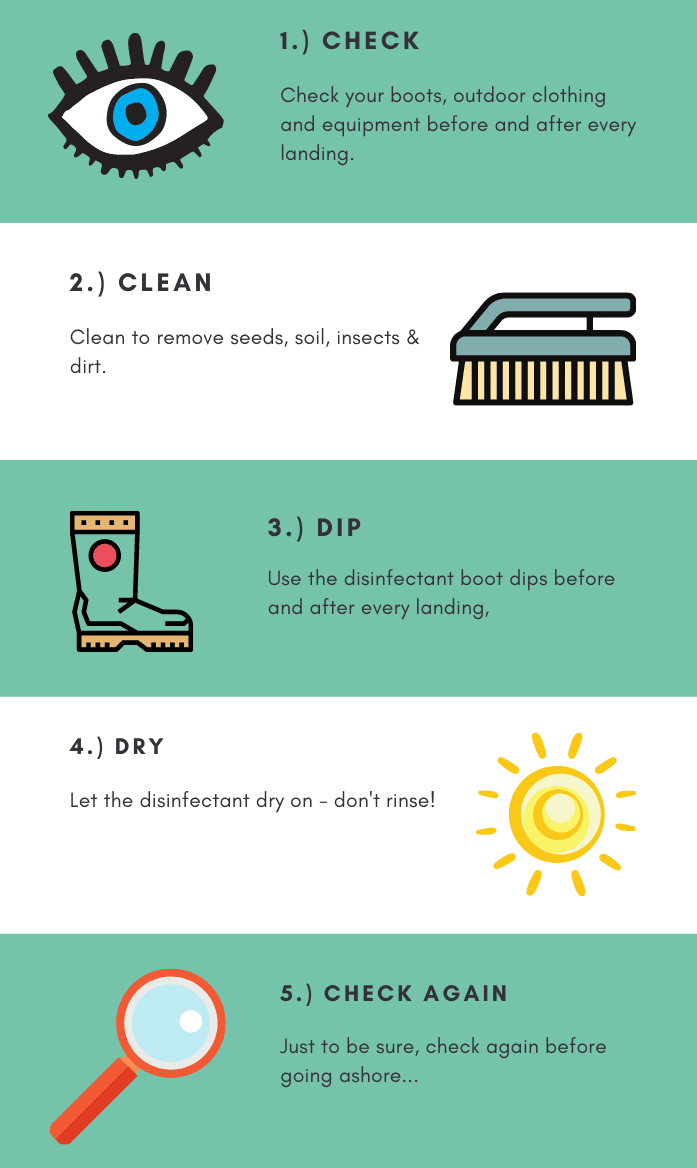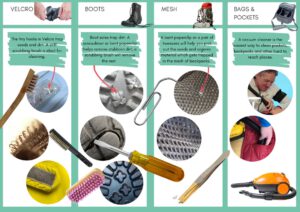Biosecurity – Help Protect South Georgia
After habitat restoration projects to remove invasive species such as reindeer, rats, mice and weeds, South Georgia is one of the most pristine environments in the world. Practicing thorough biosecurity is the single most important thing you can do to protect South Georgia.
Our Biosecurity Handbook is the one-stop-shop for all of our biosecurity policy & procedures.
Highly Pathogenic Avian Influenza
Avian influenza is a viral disease that primarily affects birds. Low pathogenic avian influenza viruses are common in wild birds and often cause no signs of disease. However, some strains of the virus including H5 and H7 are highly pathogenic in domestic poultry and can cause high mortality if they escape into wild bird populations. These are known as highly pathogenic avian influenza (HPAI).
Outbreaks of HPAI has caused the death of high numbers of birds across the globe. In October 2023 HPAI was confirmed on Bird Island, South Georgia in the brown skua populations. Since then, a number of other cases of symptomatic birds and above baseline mortality have been reported to GSGSSI at a number of other sites across South Georgia. Subsequently laboratory tests on kelp gulls and brown skua from these sites have also tested positive for HPAI. In addition, a high level of mortality has been detected in elephant seal pups at three sites around South Georgia and animals have displayed symptoms which are consistent with HPAI and investigations are ongoing to determine the cause. GSGSSI monitoring of the outbreak is ongoing in partnership with the British Antarctic Survey (BAS), Animal and Plant Health Agency (APHA) and the International Association of Antarctica Tour Operators (IAATO).
Updated guidance on how to manage HPAI is available in Section 9 of the Biosecurity Handbook. This guidance describes the tiered response in relation to risk and presence of HPAI, enhanced biosecurity procedures, signs to be vigilant for and the steps that will be put in place for different groups / activities depending on the response level. As part of the response, some sites on South Georgia may be closed to visitors either temporarily or for the remainder of the season. At other sites, visitors are asked to continue following established biosecurity procedures to decontaminate clothing, footwear and field equipment before and after any landing between regions and sites.
Enhanced biosecurity procedures adopted this season require visitors to apply extra caution when cleaning clothing and equipment that has been used in other wildlife areas where avian influenza has been confirmed or suspected. In addition, GSGSSI requires that an expert guide or researcher familiar with bird behaviour performs an assessment prior to each landing and remains vigilant for signs of the disease if ashore. Visitors must not kneel, lie or sit on the ground and remain at least 5m from wildlife. If suspicious signs are detected, the landing must be aborted and reported to GSGSSI.
A table of response levels/closures is available to view here:
Visiting South Georgia? Read On…
Non-native species can spread to South Georgia, or move between different parts of South Georgia as a result of our activities. Seeds, microorganisms, and even insects can hitchhike on footwear, attached to clothing, or in bags that have been used in the outdoors previously. By following a few simple steps, you can help prevent this.
Before Leaving Home
Ideally, it’s best to buy new outdoor clothing and equipment for your trip to South Georgia. This ensures it’s perfectly clean from seeds, soil and insects. Choose equipment which is easy to clean and biosecure. Where possible avoid:
- Velcro. It holds on to seeds and dirt and is really hard to clean.
- Mesh. Some backpacks have breathable mesh back liners, mesh water bottle holders, and mesh is sometimes used in a breathable layer in waterproof trousers. Seeds get stuck in the mesh and they are really hard to remove.
- Narrow boot treads. The more ‘open’ the treads on the soles of your boots the less likely they are to become clogged with soil and dirt, and the easier they are to clean.
If you already have outdoor clothing and equipment you’d like to bring, examine and clean clothes, footwear, and bags thoroughly. Examine and clean all clothing, including pockets, seams, Velcro fasteners, and footwear soles for dirt and organic material. Use a vacuum cleaner, brushes, and water where necessary to ensure all seeds and dirt have been removed.
Before and After Every Landing
It’s important to repeat the biosecurity checks and cleaning before and after every shore landing. This ensures that you don’t accidentally spread invasive species and wildlife diseases between sites, and helps make your visit truly sustainable.



